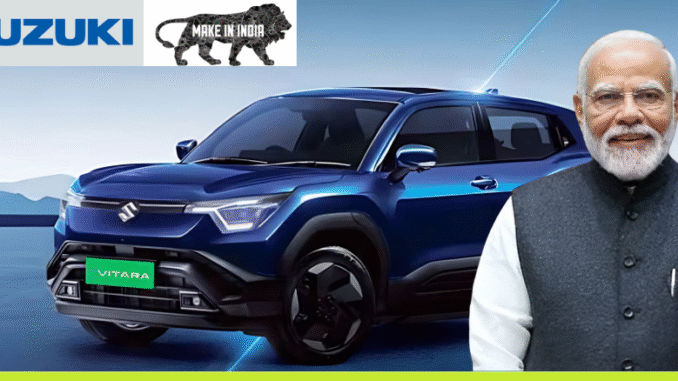
Japan’s Suzuki Motor has announced a massive investment of US$8 billion (approximately 700 billion rupees) in India over the next five to six years—a move revealed as the automaker began production of its first electric vehicle at the Hansalpur plant in Gujarat. This investment will establish India as Suzuki’s global production hub for electric cars, building on Maruti Suzuki’s 17-model export strength to around 100 countries—including Japan and Europe.
Launch and Export Ambitions for e Vitara
Suzuki flagged off production for the new “e Vitara” mid-sized SUV, with Maruti set to export 50,000–100,000 units a year. While a launch date for the Indian market is yet to be announced—owing to high battery costs—exports will begin to key global markets. The e Vitara will compete with the Hyundai Creta and Mahindra XEV 9e, among others, in a global push that strengthens Suzuki’s foothold in the EV segment[reuters].
e Vitara: Features and Specifications
The Maruti Suzuki e Vitara is a five-seater electric SUV based on a platform co-developed with Toyota. It comes with two LFP blade-cell battery options: 49 kWh (143 PS; 189 Nm, FWD, approx. 400 km range) and 61 kWh (174 PS, over 500 km range), supports fast DC charging (up to 80% in ~50 minutes), and is equipped with advanced safety features—7 airbags, Level 2 ADAS, lane assist, and more. The tech-rich interior boasts twin 10-inch floating displays, Infinity premium audio, ventilated seats, and smart connected features. Dimensions are 4275 mm (L) x 1800 mm (W) x 1640 mm (H), with a 2700 mm wheelbase.
India as a Global Mobility and Clean Energy Hub
The Gujarat plant, with a planned one-million-unit capacity, is expected to become one of the world’s largest auto manufacturing sites. Indian Prime Minister Narendra Modi—present at the launch—hailed the EV rollout as a pivotal moment for ‘Make in India’, urging support for domestically produced vehicles. Suzuki’s investment and the plant’s international focus underscore India’s role in the global shift to clean mobility, as the country aims for 30% EVs by 2030 while outpacing global car market growth and investing in localized EV value chains.


